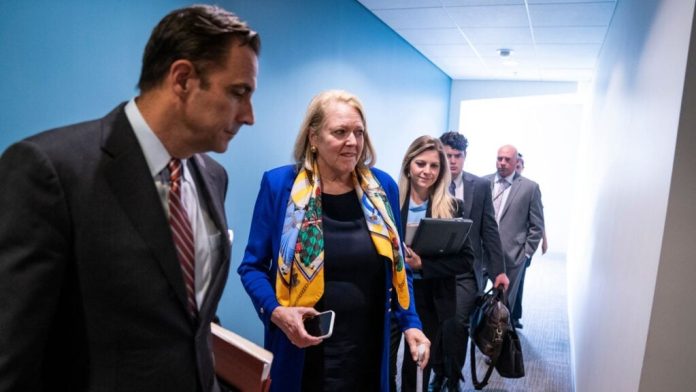In April, we’ll go deep on money and finance for a special theme month, by talking to leaders about where the mortgage market is heading and how technology and business strategies are evolving to suit the needs of buyers now. Inman’s Best of Finance returns for 2025, celebrating the leaders in this space. And subscribe to Mortgage Brief for weekly updates all year long.
A federal judge has put a temporary hold on the Trump administration’s move to fire all but 200 of the Consumer Financial Protection Bureau’s 1,700 employees, saying she has yet to weigh the merits of a lawsuit challenging the legality of dismantling the bureau.
Layoff notices went out Thursday to more than 1,500 CFPB employees, as an “approximately 200-person agency allows the bureau to fulfill its statutory duties and better aligns with the new leadership’s priorities and management philosophy,” CFPB Chief Legal Officer Mark Paoletta said in a court filing Friday.
TAKE THE INMAN INTEL INDEX SURVEY FOR APRIL
Paoletta said employees who received layoff notices Thursday “are still CFPB employees for 60 days” and that the bureau “will continuously assess … workforce needs and assess and adapt and make appropriate changes to ensure compliance with statutory duties and account for changing circumstances.”
U.S. District Judge Amy Berman Jackson, who is presiding over the case that could determine the CFPB’s fate, issued a temporary restraining order Friday halting the layoffs, pending an April 28 evidentiary hearing.
“I’m willing to resolve it quickly, but I’m not going to let this RIF [reduction in force] go forward until I have,” Jackson said during a hearing, as reported by the Associated Press.
A union representing many of the CFPB’s staff sued Acting Director Russel Vought on Feb. 9, challenging what it characterized as the Trump administration’s “ongoing effort to dismantle the CFPB.” Consumer groups, including the National Consumer Law Center and the NAACP, joined the legal battle, and attorneys general of 13 states and the District of Columbia also filed an amicus brief seeking to forestall mass layoffs.
Jackson put layoffs of 1,200 CFPB workers on hold in a Feb. 19 temporary restraining order. But a three-judge panel from the U.S. Court of Appeals for the District of Columbia Circuit on April 11 ruled the Trump administration could lay off workers it had determined through a “particularized assessment” were not needed to perform duties mandated by Congress.
Trump administration details cuts
The CFPB provided that assessment to Jackson on Friday — the day after the layoff notices went out. In a five-page declaration, Paoletta detailed the cuts to be made in each of the bureau’s departments and why those workers were no longer needed.
Paoletta also submitted a memo that he sent to all CFPB staff on April 16, detailing the Trump administration’s supervision and enforcement priorities for the bureau.

Mark Paoletta
“The Bureau will focus its enforcement and supervision resources on pressing threats to consumers, particularly service members and their families, and veterans,” Paoletta said in the memo. “To focus on tangible harms to consumers, the bureau will shift resources away from enforcement and supervision that can be done by the states.”
Paoletta said in his court declaration Friday that the CFPB’s single biggest department, the supervision and enforcement division, will be cut from 487 employees to 50, as most of its workers no longer needed under the Trump administration’s new priorities, Paoletta said.
Since Trump began his second term in office, the CFPB has dropped nine pending consumer lawsuits, including a controversial RESPA complaint against Rocket Homes.
In his April 16 memo, Paoletta called for the supervision and enforcement division to “decrease the overall number of ‘events’ by 50 percent” with a focus on “conciliation, correction, and remediation of harms subject to consumers’ complaints” and “collaborative efforts with the supervised entities to resolve problems so that there are measurable benefits to consumers.”
The CFPB’s Operations Division of 323 employees performs duties “not required by statute” and will be cut to 30 employees, Paoletta said in his declaration.
The Research Monitoring and Regulations Division includes the Office of Service Members Affairs, the Office of Financial Protection for Older Americans, and the Office of the Private Education Loan Ombudsman.
While those offices perform duties mandated by Congress, Paoletta said he determined “that the statutory duties of each [office] could be performed by one person.” The division’s current staff of 230 employees will be reduced to 22.
Similarly, the CFPB Director’s Office includes the Office of Minority and Women’s Inclusion and the Office of Fair Lending and Equal Opportunity, which enforces the Truth in Lending Act (TILA) and Home Mortgage Disclosure Act (HMDA). Although those duties “are required by statute,” Paoletta said he determined “that the statutory functions of each of these offices could be performed by one person” and staffing in the Director’s Office will be cut from 86 employees to five.
The CFPB’s Consumer Response and Education Division of 149 employees will also be cut “substantially,” as the bureau “retains dozens of contractors to field consumer complaints,” Paoletta said.
Now that the Trump administration has provided a “particularized assessment” of why the employees it intends to fire are not needed to perform duties mandated by Congress, Judge Jackson will hear arguments to the contrary.

Lauren Saunders
“Congress created the CFPB to address the gaps that allowed nonbank mortgage lenders, student lenders, payday lenders and other nonbank companies to escape accountability,” Lauren Saunders, associate director of the National Consumer Law Center, said in a statement. “The CFPB cannot simply shirk the consumer protection responsibilities Congress gave it and expect states to enforce federal law.”
In his April 16 memo, Paolleta said the bureau will shift its focus away from nonbank lenders and “focus on the largest banks and depository institutions.”
“Nonbanks’ shoddy business practices were a significant driver of the financial crisis of 2007, causing millions of people to lose their homes, jobs and savings,” Saunders said. “By focusing solely on large banks, and ignoring the statutory mandate to supervise nonbanks and enforce the law across its entire jurisdiction, this Administration is clearing the way for unscrupulous companies to once again violate the law and take advantage of ordinary people.”
DOGE staffer allegedly drove layoff process
How rigorously the CFPB analyzed the duties of the workers to be fired is another area of contention.
A CFPB employee who was part of the “reduction in force” (RIF) team claimed in a court declaration Friday that the team was managed by a Department of Government Efficiency (DOGE) employee who “kept the team up for 36 hours straight to ensure that the notices would go out” Thursday and “was screaming at people he did not believe were working fast enough to ensure they could go out on this compressed timeline, calling them incompetent.”
The anonymous employee’s declaration — filed by attorneys representing the CFPB’s union employees — also claimed members of the team expressed concerns that “there was a court order requiring that they do a particularized assessment, but they were told that all that mattered was the numbers.”
“The direction to ignore the concern came from Mark Paoletta, who said that the numbers-based RIF should move forward, and that leadership would assume the risk,” the employee claimed.
The CFPB did not respond to Inman’s requests for comment.
Paoletta was appointed by President Trump in November as the Office of Management and Budget’s general counsel. In that role — which remains his full-time job — Paoletta was expected to “work closely” with DOGE “to cut the size of our bloated government bureaucracy, and root out wasteful and anti-American spending,” Trump said in an announcement.
After the November election, DOGE cheerleader Elon Musk posted on his social media platform, X, that the Trump administration should “Delete CFPB. There are too many duplicative regulatory agencies.”
Consumer groups and Democrats who support the CFPB have pointed out that Musk’s plans to provide a mobile payment service through X would be regulated by the CFPB.
Get Inman’s Mortgage Brief Newsletter delivered right to your inbox. A weekly roundup of all the biggest news in the world of mortgages and closings delivered every Wednesday. Click here to subscribe.
Email Matt Carter




